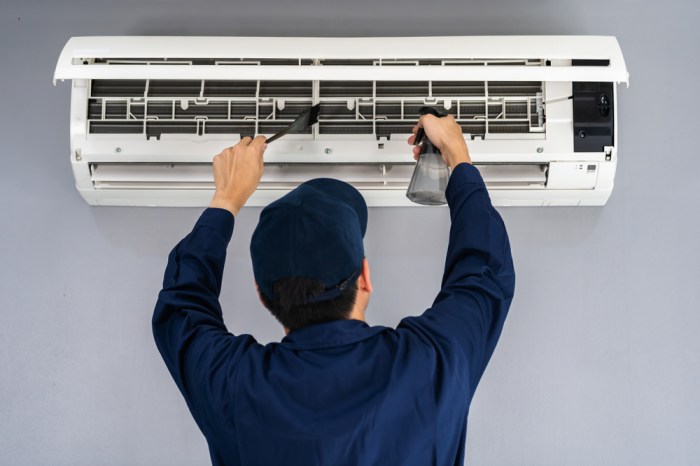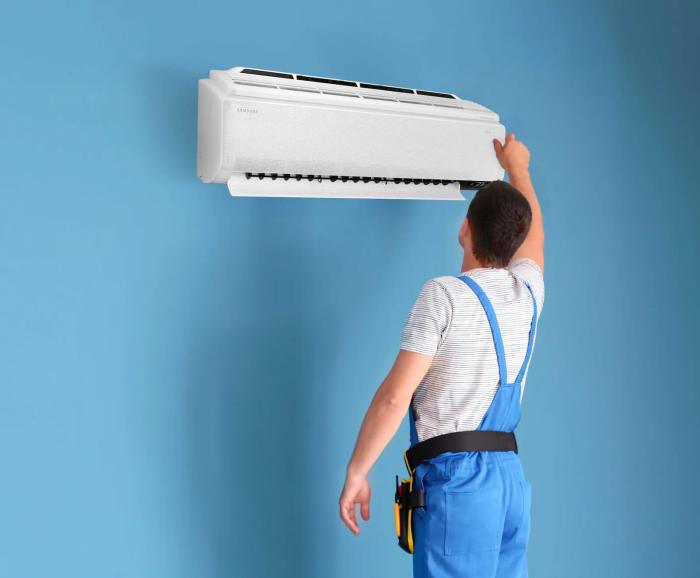Understanding Air Conditioner Service Cost: Factors, Average Range, Types, and DIY vs. Professional Servicing
Exploring the world of air conditioner service cost unveils a complex interplay of factors that determine the expenses involved. From the influence of type and age to the significance of routine maintenance, this topic delves into the nuances of keeping your air conditioner in top condition without breaking the bank.
As we navigate through the various aspects of air conditioner service costs, you'll gain valuable insights into the average cost range, different types of services available, and the age-old debate of DIY maintenance versus professional servicing.
Factors Affecting Air Conditioner Service Cost
When it comes to servicing an air conditioner, several factors can influence the overall cost. Understanding these factors can help homeowners make informed decisions about maintaining their cooling systems efficiently and cost-effectively.
Type and Age of the Air Conditioner
The type and age of the air conditioner play a significant role in determining the service cost. Older units or those with complex designs may require more time and effort to service, leading to higher expenses. Additionally, specialized equipment or parts for certain types of air conditioners can also impact the overall cost.
Maintenance History and Frequency
The maintenance history and frequency of servicing can affect service expenses as well. Regular maintenance can help prevent major breakdowns and costly repairs in the long run. If an air conditioner has not been properly maintained or serviced on a regular basis, it may require more extensive work, resulting in higher service costs.
Additional Services
Apart from the basic maintenance tasks, additional services can also increase the overall cost of servicing an air conditioner. These may include tasks such as duct cleaning, refrigerant recharging, or replacing worn-out components. While these services are essential for optimal performance, they can add to the total service expenses.
Average Cost Range for Air Conditioner Servicing

When it comes to servicing residential air conditioners, the average cost range can vary depending on several factors.
Routine Maintenance vs. Repair Services
Routine maintenance for air conditioners typically falls within the range of $70 to $200. This includes tasks like cleaning filters, checking refrigerant levels, and inspecting the overall system for any issues. On the other hand, repair services can cost significantly more, ranging from $150 to $600 or more, depending on the extent of the repairs needed.
Seasonal Variations in Service Costs
During peak seasons like summer, when air conditioners are in high demand, service costs may increase due to the higher workload for technicians. This can result in a slight bump in prices compared to off-peak seasons.
Geographical Location Influence
The geographical location can also play a role in determining air conditioner service costs. In areas with a higher cost of living, service prices may be slightly elevated to align with the overall expenses in that region. Additionally, rural areas might have lower service costs compared to urban areas due to lower overhead expenses for service providers.
Different Types of Air Conditioner Services

When it comes to air conditioner services, there are various types offered to ensure the optimal performance and longevity of your cooling system. Let's delve into the differences between regular maintenance, repairs, and full system replacements, as well as their importance in keeping your air conditioner running smoothly.
Regular Maintenance
Regular maintenance is crucial for the upkeep of your air conditioner. This type of service typically includes cleaning or replacing filters, checking refrigerant levels, inspecting components for wear and tear, and ensuring proper airflow. By scheduling regular maintenance, you can prevent costly repairs and extend the lifespan of your air conditioner.
Repairs
Repairs are necessary when your air conditioner is not functioning correctly. Common issues that may require repairs include refrigerant leaks, faulty components, strange noises, or uneven cooling. It is important to address these issues promptly to prevent further damage and ensure the efficiency of your cooling system.
Full System Replacements
In some cases, a full system replacement may be the best course of action, especially if your air conditioner is old, inefficient, or constantly breaking down. A new system can improve energy efficiency, enhance indoor comfort, and reduce the need for frequent repairs.
While it may be a significant investment upfront, a new air conditioner can save you money in the long run.By understanding the different types of air conditioner services and their importance, you can take proactive steps to maintain the performance and longevity of your cooling system.
Regular maintenance, timely repairs, and considering a full system replacement when necessary are key factors in ensuring your air conditioner operates efficiently and effectively.
DIY vs. Professional Air Conditioner Servicing

When it comes to air conditioner servicing, homeowners often face the dilemma of whether to attempt a DIY approach or hire a professional service. Both options have their own benefits and drawbacks, and understanding them is crucial in making an informed decision.
Benefits and Drawbacks of DIY Maintenance
- Benefits:
- Cost savings: DIY maintenance can save you money on service fees.
- Convenience: You can perform maintenance tasks at your own pace and schedule.
- Drawbacks:
- Risk of damage: Incorrect DIY repairs can lead to further damage to your air conditioner.
- Lack of expertise: DIY maintenance may not address underlying issues effectively.
Risks Associated with DIY Repairs
- Incorrect repairs can lead to more damage and costly repairs in the long run.
- Voiding warranty: DIY repairs may void the manufacturer's warranty on your air conditioner.
When to Seek Professional Help
- Complex issues: For complex problems or repairs that require specific expertise, it's advisable to hire a professional.
- Safety concerns: If a repair involves electrical components or refrigerant handling, it's best to leave it to the experts.
Determining DIY Suitability
- Assess your skills: Consider your technical abilities and experience before attempting DIY maintenance.
- Research: Make sure you have access to reliable guides or tutorials for the specific task you want to perform.
Last Point
In conclusion, the discussion on air conditioner service cost sheds light on the intricacies of maintaining your cooling system. By understanding the factors at play, average cost ranges, types of services, and the pros and cons of DIY versus professional help, you're better equipped to make informed decisions that ensure your air conditioner's longevity and efficiency.
Frequently Asked Questions
What factors can influence air conditioner service cost?
Factors such as the type and age of the air conditioner, maintenance history, and additional services required can all impact the overall service cost.
What is the average cost range for servicing residential air conditioners?
The average cost range for servicing residential air conditioners can vary depending on the services needed but typically falls within a certain range based on industry standards.
What are the risks associated with DIY air conditioner maintenance?
DIY maintenance can lead to potential risks such as damaging the unit further or voiding warranties. It is important to assess one's skills and knowledge before attempting DIY repairs.
When should I consider hiring a professional for air conditioner servicing?
It is advisable to seek professional help for air conditioner servicing when dealing with complex issues, major repairs, or when unsure about the proper maintenance procedures to avoid causing more harm to the unit.
How can I determine if a DIY approach is suitable for certain maintenance tasks?
Assessing one's comfort level with tools, knowledge of air conditioner systems, and the complexity of the task can help determine if a DIY approach is suitable. When in doubt, consulting a professional is always a safe option.